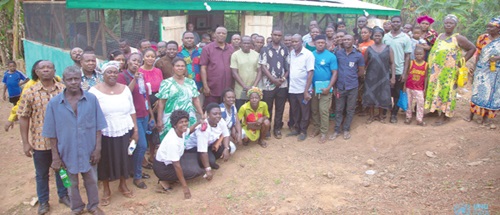The Namusi community, one of the farming communities in the Yilo Krobo Municipality in the Eastern Region, has had solar-powered gari processing machines (DAS Portable Prefab Biogas Plant) to support clean energy and sustainable gari processing.
The installation, which is part of the Innovation for Clean Agricultural Technologies (INFOCAT) Project by the United Nations University-Institute for Natural Resources in Africa (UNU-INRA), is intended to boost the economic activities of farmers in the area, especially women farmers.
The project is a special programme showcasing and piloting youth-designed cleaning technology solutions developed by youth to address the challenge faced by smallholder women farmers.
The project is also aimed at showcasing the creativity and problem-solving capabilities of young green innovators, who have designed context-appropriate clean technologies to enhance agricultural productivity, expand access to clean energy, reduce drudgery and promote climate resilience among smallholder farmers and post-harvest crop processors.
The plant converts cassava peels and wastewater from pressing into biogas, providing four key benefits: waste management, clean cooking, electricity generation and bio-fertiliser production for a circular economy.
Integrated system
Furthermore, the biogas produced is connected to a solar system to create a hybrid power source, ensuring a reliable electricity supply when the sun dims. It is also used for clean cooking during cassava roasting, replacing firewood and charcoal.
![]()
Enoch Kofi Boadu, the CEO of DAS Biogas and Construction Limited, explaining how one of the machines works
In addition, the plant produces nutrient-rich bio-fertiliser that is applied to farms to improve soil fertility and crop yields.
This integrated system lowers energy cost, promotes sanitation and hygiene, protects the health of women by eliminating smoke exposure and creates long-term economic and environmental benefits for the community.
During the programme, the innovators did a test-run and demonstrated how the technologies function and trained women users on the effective operation of the technologies.
The key stakeholders were engaged in discussions on fine-tuning, scalability, sustainability and adopted pathways.
Industrialise agriculture
The Project Coordinator and the Research Fellow with the United Nations University, Dr Tornye, said the project, which was being implemented in the Eastern, Central and Volta regions, at Yilo Krobo, Gomoa East and the North Tongu districts, respectively, was on a piloting phase and was looking at how to quicken the energy transition, how to industrialise the agricultural sector and how to provide clean energy solutions to the communities that have energy poverty.
![]()
Some of the participants demonstrating how gari is produced, at the event
Dr Tornye said in his key message that “we as a country could not continue to import the machines from China and other countries, as we have the people who are capable of designing such machines in our own country,” adding: “The youth need employment and must be empowered with the technical skills and the smart financing mechanisms.”
He said the youth were in the communities and they understood the problems of the communities better, and, therefore, they could design green machines, which would feed into the country’s energy transition agenda and create their own jobs.
Dr Tornye said women would also have machines that could support them to increase their work and consequently increase their incomes.
“Energy transition must incorporate youth entrepreneurs and must also incorporate energy access for vulnerable women in the communities. It must also power our agriculture sector because it is the biggest employer of the whole continent,” the Project Coordinator stressed.
Conversion of waste
The CEO of DAS Biogas and Construction Limited, Enoch Kofi Boadu, stated that “this project demonstrates how waste can be converted into valuable resources that power homes, industries, farms and entire communities.”
He said DAS Biogas was committed to helping households, businesses, and agricultural ventures reduce costs, improve sanitation and embrace sustainable energy solutions that protect both people and the environment.
He expressed DAS Biogas’ appreciation to UNU-INRA and its sponsors for their vision and support in implementing a project that would go a long way in promoting sustainable energy, environmental protection and economic growth.
The leader of the Gari Processors Group at Namusi, Margaret Natey, on behalf of the community, thanked the benefactors for the project, which she said would improve their gari processing economic activities in the area.
She said for over 30 years, she had been teaching many youths and women in the Namusi community and other nearby communities about the gari processing business, and that many of her apprentices now had their own businesses.
She added that “with the new technology, many more will learn the business and have money in their own pockets.”

